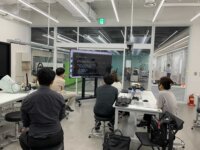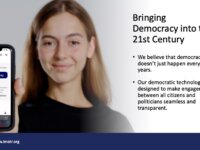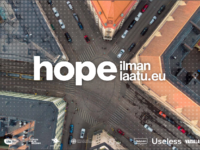In an increasingly digital world, Participa.gov represents our vision for civic participation in political decision-making processes. Participa.gov is the Portuguese Public Administration's centralized, cross-cutting platform for facilitating participatory processes at all levels of government. It employs cutting-edge technology to ensure that citizens can actively participate in policy decision-making via secure and transparent mechanisms that foster trust.
Innovation Tag: Public Consultation
Small and medium-sized companies often cannot afford investments in Artificial Intelligence technologies. Through AI Friends project, AI became more accessible, affordable, and familiar for entrepreneurs and citizens. AI festival, training, co-working spaces, and pilot solution consulting is operated through the cooperation of universities, research institutes, industries, government, and citizens over the last four years.
In order to bridge the gap between representatives and represented, the Brussels Parliament intends to open its doors to all the inhabitants of the Brussels-Capital Region. It has therefore decided to include in its rules of procedure a system of citizen participation: the Deliberative Committees (commissions délibératives). These committees, made up of 15 elected officials and 45 citizens chosen by lot, are responsible for drawing up recommendations on a given topic, which the Parliament must…
Democratic Technology brings governments and citizens into the 21st century. It empowers engagement in real time on daily issues, between people and politicians in a seamless and transparent way. Using geolocation or an address entry, real verified users are shown their government representatives on their smartphones enabling direct one-to-one messaging on important events. Collected anonymized data enables evidence based decision making for the public and governments.
Bullying is one of the main social challenges in Lithuania with about 30% of children becoming victims of bullying few times a week. Most of them don’t report the incidents while school officials often can’t recognize and effectively provide help for both victims and bullies. “Patyčių dėžutė” is a mobile app which allows children to anonymously report bullying accidents, while REAGUOK.LT is a e-learning platform for teachers with all the relevant information about how to respond to…
Innovacion Publica (IP) 360 seeks to respond to the low levels of trust in government and to the unequal distribution of innovation in Latin America's public sector. The project has a holistic approach to reach local governments that are not part of the mainstream opengov networks. It delivers actions in 19 local governments to strengthen citizen participation, transparency and digitalization. The lessons learned are then scaled up through a regional learning community of public innovators.
Impact Canada is a whole-of-government effort that deploys outcomes-based policy and program approaches. It features a novel set of rules, processes, and supports to allow the Government of Canada to support innovative methods like challenges, pay-for-success funding, and behavioural insights, which previously faced significant barriers to adoption. Through these systems-level changes, the Government can now apply these approaches to produce better outcomes for citizens and create greater public
This air quality monitoring network in Helsinki region provides information from locations of fixed monitoring stations but the network consists currently of only few monitoring locations. The project aims to produce comprehensive hyper-local air quality monitoring network including crowdsourcing portable monitors that gives citizens air quality information of the exposure to air pollution in places where they live and they travel in the city. The main beneficiaries are therefore the citizens of…
Learning Together for Better Public Engagement (Learn4PE) was a pilot initiative designed to build public engagement capacity across the Government of Canada. In its first iteration, participants spent five weeks learning together in English and French, both online and by participating in live sessions with experts. While targeted towards federal public servants, registration was open to all, enabling the exchange of relevant ideas and resources.
Informed Participation is a unique way to bring the public into government decision making. It gives government a method to solve complex issues with the public in a way that gives them a meaningful role in balancing competing interests. Public policy is becoming increasingly complex and trust in government is declining, so new innovative ways of engaging with citizens is needed. This method shifts engagement from obtaining buy-in to building ownership and creates more legitimate solutions.




